- About Us
- Columns
- Letters
- Cartoons
- The Udder Limits
- Archives
- Ezy Reading Archive
- 2024 Cud Archives
- 2023 Cud Archives
- 2022 Cud Archives
- 2021 Cud Archives
- 2020 Cud Archives
- 2015-2019
- 2010-2014
- 2004-2009
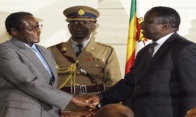 |
The Burgers Are Better: |
Click here for Part I- The Burgers Are Better: Examining Zimbabwe
What led to the disaster?
In the Bottom Billion, Paul Collier wrote that:
“terrible governance and policies can destroy an economy with alarming speed.”
To illustrate the point, Zimbabwe’s economy went from hero to zero as quickly as a farmer can be run off their land.
The descent into peril was achieved almost single handedly by the Robert Mugabe/Zanu-PF Government of Zimbabwe, in power since 1980, via the unwinding of a raft of basic rights and the breaking of economic policy rules.
At the forefront of these were the dismantling of property rights and the violation of human rights, with the latter fulfilling the dual roles of policy implementation and suppression of the Zimbabwean people.
The dismantling of property rights was the first in a series of bad policies. The violation of human rights, commencing early in the Mugabe Government’s tenure, left it in a position where it must hold onto power at all cost – leading to further human rights violations – a self perpetuating cycle. Accompanying the rights violations was the sequential destruction through bad policy of the components of Zimbabwe’s gross domestic product: consumption, investment, government spending and net exports.
This essay is the second of two about Zimbabwe. The first described the present Zimbabwe situation including the economic, social and humanitarian crisis, and the context for the recently formed Inclusive Government of Robert Mugabe and Morgan Tsvangirai. This, second essay plots in a number of key points the chronology of the path to economic ruin in Zimbabwe, includes an account of how the government got away with it, and concludes with a simple discussion of historical international action on Zimbabwe and some basic principles for the way forward.
Land reform?
Underpinning most modern economies are property rights that are enforceable by law. The three basic principles of private property are (1) exclusivity of rights to choose the use of a resource (you can chose to do what you like with your property, but society will only pay you for your activity if it has value - thereby encouraging productive use), (2) rights to exchange the resource at mutually agreeable terms (buyer and seller agree on the price to exchange ownership of land) and (3) exclusivity of rights to the services of a resource (you don’t have to share your land with other private citizens).
Property rights are a facility for the allocation of resources to productive use by means of peaceful competition, rather than by violence. With well-defined property rights, the value of an asset and market exchange values far outweigh the status of the individuals competing for ownership and use of a resource.
In the case of Zimbabwe, property rights were replaced with violence when the Mugabe Government began a process to forcefully remove white owners of agricultural land under the banner of a policy called ‘land reform’.
The land reform policy could have been predicated on the right principles: large disparities in wealth and landholdings between a white minority and an impoverished black majority. Well, at least in theory. In reality, most of the seized land went to Mugabe regime members, supporters and war veterans.
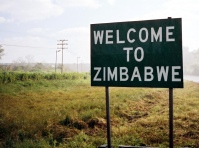
The process of removing productive landholders from their land, thereby undoing society’s allocation of the land resource to productive use, was not accompanied by an effective program to train and educate new landholders in appropriate land management practices. These landholders had no interest in sustaining the productivity of their land – first cash crops were gratefully received, after which land and infrastructure that had been built up over decades was left to quickly degrade, and workers were left unemployed.
Since land reform began, Zimbabwe’s agricultural exports, especially tobacco, have declined sharply and the sector has continued to be choked by a lack of productivity and skills.
From bad to worse…
The sectors of an economy are heavily linked – one thing leads to another. As agricultural exports began to slow on the back of land reform so did the overall economy. As the economy began to slow, government revenue began to fall. The government resorted to printing more money to feed its coffers. The predictable outcome of increasing the money supply in a productivity-constrained economy (all the farmers were being kicked off their land and the economy was slowing) was inflation and then hyperinflation – the currency lost its value.
Inflation was accompanied by regulatory price controls that constrained the prices that businesses could charge for their goods – violation of principle 2 of property rights. So as the costs of inputs for regular business holders skyrocketed with surging inflation, businesses were unable to recover their costs in prices. The outcome was a large scale reduction in business activity.
Another peculiar policy, but perhaps believable in the Mugabe context, was one that required businesses to exchange a certain proportion of any foreign exchange earnings with the government at an artificially low exchange rate. The government then exchanged its foreign currency receipts from the trades at black market exchange rates for a massive profit (see below) – in an attempt to plug the government revenue gap caused by a slowing economy. This essentially carved out tidy profits for the government under a poorly disguised backhander, and completed the troika of property rights violations.
Investment dried up…
Sensing an impending economic disaster in Zimbabwe in the late 1990’s, masses of capital fled the country and foreign investors abandoned the Zimbabwean currency. The 1997 ‘Black Friday’ market crash was evidence that the finance world had decided that Zimbabwe was truly on the nose. The simultaneous removal of investment flows and failure of financial markets, both crucial to the functioning of the economy, were another death knell. The Mugabe Government’s refusal to accept a rescue package from donors including the World Bank reinforced the new, negative direction for Zimbabwe.
Borrowing heavily…
While all of this occurred, in addition to printing money the government began to borrow heavily to meet its financial obligations (staying in control of a failing state can be costly). Soon, the interest on such liabilities began to divert government money away from health and education. The final crucial component of gross domestic product (GDP), domestic government spending, disintegrated.
Other notable low points included The Indigenization bill in November 2007 and ‘Operation Murambutsvina’. The former requires every business to have a majority shareholding by non-white Zimbabweans. ‘Operation Murambatsvina’ (Operation Drive Out Trash or Operation Drive Out Rubbish) was a policy to forcefully clear slum areas across Zimbabwe, which effectively destroyed the informal economy (the only economy in Zimbabwe that was working) and made thousands of people homeless.
How is Mugabe and co still in business?
The logical conclusion to the story would be that the Mugabe Government was voted out, say in the elections of 2000, and replaced by a new government with a mandate for remedial policy to drag the economy out of recession. None of this occurred. Instead, Mugabe has stayed in power and his policy errors have been accompanied by the violent suppression of Zimbabwe’s people. Opposition political parties have been harried by arrests, murders and torture; elections, such as those in 2000, have been marred by rigging, violence and intimidation, with beating of voters supporting opposition parties, and food aid has been withheld from pockets of the population deemed to be unfriendly to the government. The government has maintained a ruthless grip on power, subjugating all processes that could remove it – judicial, electoral, military, or uprisings by civilians.
The key point is that Mugabe has manipulated the levers of violence, intimidation and deceit while in control of an ugly, awkward and terrifying political machine, from which tentacles reach into all aspects of Zimbabwe life. While this essay does not dwell on the aspects of the violent atrocities, which are noteworthy, it acknowledges the point that such happenings have been at the heart of the Mugabe Government’s continued political survival. The flipside is that through such violence, the Mugabe Government has become a prisoner of itself.
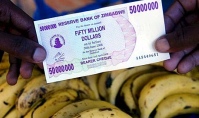
Motivations for hanging on….
One would have thought that it was better for Mugabe and his cronies to cut their losses and move on. Why would they want to hang onto an economy that was spiralling out of control and rule over people who are living in misery?
Some of the answers lie in the mass graves of Matabeleland in the west of Zimbabwe. Between 1982 and 1987, the notorious ‘5th Brigade’ under direct orders from Mugabe, stormed across the fields of Matabeleland and sowed the soils of the fertile land with Zimbabwean blood. It was a military operation to quell growing political resistance in the region. Precise numbers of civilian deaths are unknown, but most estimates converge on the figure of 10,000 with many more suspected beaten and tortured. Limbs, bodies and minds were taken in this cruel political harvest. The message was clear: “if you disagree with the Government you will die”.
The atrocities provoked such quotes as the following from a then pregnant Matabeleland woman:
“They hit me in the stomach with the butt of the gun. The unborn child broke in pieces in my stomach. It was God's desire that I did not die too. The child was born afterwards, piece by piece." (i)
Should they ever lose power, those responsible will be held accountable. The leading British Diplomat, Lord Renwick, former Ambassador to the US and South Africa, believes that Mugabe should be brought in front of an international crimes tribunal for the Matabeleland massacre. Mugabe is aware of this, because there is a government agency tasked with monitoring the Zimbabwean community memory and feelings about the Matabeleland massacre. Scars run deep in families and communities from such violent hurt, with ripples and currents that continue to circulate many generations later. If an uprising or backlash were to ever emerge it would be quashed before it had legs. If the Mugabe Government is ever forced out of rule, or to share rule, it will negotiate all manner of protective clauses and loopholes to protect against retribution – as has been observed in the recent power sharing deal.
Other motivations for hanging onto power are as simple as basic greed. Because life has become so good at the top it is believable that such privilege, and ill-gotten gains, will never easily be relinquished by the ruling elite. According to the Zimbabwe Institute (2007) (ii):
“The motivations behind the economic policy positions which have been adopted often appear perverse from a developmental viewpoint, but serve the narrow political interests of an elite which has amassed huge wealth in a very few years precisely through the chosen minority being given privileged access to key resources in a highly distorted environment.”
Keeping the ruling business afloat…..
Money is required to keep the most powerful and elite in Zimbabwe onside – this includes the ruling class and key members of the military and the police force. This class of people, by some estimates 5,000 in number, have been made wealthy beyond their kleptocratic dreams (iii). The majority of people that matter in Zimbabwe have either fled the country or have been bought out.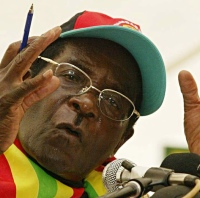
Not surprisingly, keeping the Mugabe Government business afloat is a steady stream of money from sources including (some of which are particularly creative):
1. Printing money. The US Federal Reserve and the Bank of England have recently resorted to increasing domestic money supply as a quantitative easing option of last resort, to stimulate growth in their respective economies. By contrast, the Reserve Bank of Zimbabwe has been running its money presses hot for the last decade.
2. Foreign exchange deals. As mentioned above, there is a law that requires exporters to sell up to 30 percent of their foreign exchange earnings to Zimbabwe’s Reserve Bank at an artificial ‘official’ exchange rate that is a fraction of the real market rate. Members of the ruling regime and their associates have become rich by buying up foreign currency from these businesses at this ‘official’ exchange rate and then selling it at the black market rate, pocketing the difference. Mugabe’s henchmen can buy US$100 for Z$25,000 and sell it for Z$3 million [1,200 per cent profit – no risk], at the expense of legitimate business owners.
3. Fascinatingly, those with political clout have borrowed heavily from the banks and then declined to pay, waiting for inflation to remove the burden of the original debt and claiming the ‘in duplum’ rule to evade paying interest (iv). The small depositors bear the cost, in effect subsidising the rich.
4. Mining. Zimbabwe has the world’s second largest platinum reserves after South Africa, money that invariably finds its way into the Government purse.
5. Land sales. Agricultural land sold cheaply to retired militarily personnel or overseas interests, after being seized from rightful owners.
6. Remittances from relatives abroad. The government has undertaken an aggressive strategy to encourage Zimbabweans overseas to send their money home. For example, a recent visit to the UK by the Zimbabwean Reserve Bank Governor Gideon Gono during which he urged Zimbabwean expatriates to send money home.
7. Dodgy deals with dodgy people. For example, a recent unsuccessful attempt by Joyce Mujuru, a member of the ruling elite, to sell a massive quantity of gold apparently from the Democratic Republic of Congo (DRC) through her daughter to a gold-dealing company in the UK; thereby trying to circumvent EU sanctions.
8. Gifts, deals and trade with countries such as Angola, Namibia, China, Malaysia (v) and other friends.
International contributions
International action has generally, but not always, compounded issues for Zimbabwe.
Britain has an embarrassing affiliation with the place, courtesy of the arguably flawed Lancaster House Agreement (1980), brokered under British auspices, which created the template for authoritarian rule and allowed Robert Mugabe and the ZANU-PF to consolidate and later to monopolize power (Coltart, 2008) (vi). The Lancaster House Agreement principally failed to cater for reconciliation and justice elements following the atrocities committed by both sides of the civil war in the 1970’s. It was a quick fix. The same pre-liberation nasties showed up in the Government post Lancaster House and were up to their old tricks in Matabeleland in no time at all.
Further back, the virtual bulldozing of Rhodesia (vii) by Cecil Rhodes and the British during the ‘scramble for Africa’, including the first testing of the infamous Maxim machine guns on defenceless tribes, led to a fundamentally unequitable distribution of land between whites and blacks. A century later, attempts by the Zimbabwe Government to undo this distribution of land unwittingly caused the economy to collapse.
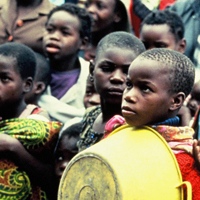 The prevailing strategy by Western countries has been to employ so called ‘smart sanctions’ that specifically target and restrict the activities of Zimbabwe’s rulers and their families. The sanctions include the freezing of assets held overseas, blocking of international transactions, and barring travel, work and education visas. The sanctions are underpinned by extensive intelligence gathering to create large dossiers and lists of unsavoury characters, such that they would never be able to set foot in a country, invest in it, or have their children attend educational institutions. Unfortunately, while such measures have been disruptive, for every country with ‘smart sanctions’ there are a handful of others with open arms, ready to do business.
The prevailing strategy by Western countries has been to employ so called ‘smart sanctions’ that specifically target and restrict the activities of Zimbabwe’s rulers and their families. The sanctions include the freezing of assets held overseas, blocking of international transactions, and barring travel, work and education visas. The sanctions are underpinned by extensive intelligence gathering to create large dossiers and lists of unsavoury characters, such that they would never be able to set foot in a country, invest in it, or have their children attend educational institutions. Unfortunately, while such measures have been disruptive, for every country with ‘smart sanctions’ there are a handful of others with open arms, ready to do business.
Generally, everything thrown at the Zimbabwean Government by the West has been deftly used by Mugabe to polarise opinion of the Zimbabwean people against the West, even though the modern day sanctions do not deliberately target trade, broader economic activity or welfare in Zimbabwe.
Australia was part of a team – along with South Africa and Nigeria – that recommended Zimbabwe be suspended from the Commonwealth in 2002 after the persistent run-down of the Zimbabwe economy, un-democratic elections and reports of the Zimbabwe Government terrorising its people. After an Australian push for an extended suspension, Zimbabwe withdrew from the Commonwealth.
South Africa is the country most affected; sharing borders with Zimbabwe it has many trade ties in services and commodities and it is also the destination of choice for fleeing Zimbabweans. More recently, South Africa has been involved in attempts to stabilize the Zimbabwe situation. In September 2008, South Africa's former president Thabo Mbeki helped broker the arguably flawed power-sharing deal that led to the current Mugabe/Tsvangirai Inclusive Government. However, given the outcome, with Mugabe retaining control of the much-feared National Security Council and the military, the police and Reserve Bank, South Africa’s so-called ‘quiet diplomacy’ approach could be interpreted more as quiet complicity.
In the background, China has been negotiating, lobbying, doing deals, providing money in exchange for a stake in the Zimbabwe mining industry, allowing cheap prices on infrastructure and equipment, and of course, weapons (viii).
What to do
The path forward for Zimbabwe is fraught with difficulty. Even the Inclusive Government is potentially a double-edged sword. The risk is that in a government run by two parties, both parties have vested interests and become party to corruption, without the appropriate checks and balances that an opposition can provide. At the very least, Mugabe has more knives than a Tim Shaw commercial in the waiting for Tsvangirai, and the mere survival of the Inclusive Government, let alone any major reforms, will be a major surprise to many in the international community.
Assuming such obstacles can be overcome, and this is a big assumption, the road back will take decades and will include such considerations as the re-establishment of societal fundamentals. Notably the restoration of the rule of law – and then the formulation and committed implementation of a bold, comprehensive economic programme  which coordinates fiscal and monetary interventions, and which wins the support of domestic and international economic actors.
which coordinates fiscal and monetary interventions, and which wins the support of domestic and international economic actors.
One of the more pressing imperatives is to stop inflation. This could be achieved by adopting a foreign currency, preferably the Rand (South Africa). Steps have already been made in this direction as the Central bank of Zimbabwe has allowed 1,000 retailers and 200 wholesalers to sell in foreign money, while motorists will also be able to buy fuel in foreign currency. The exchange rates that are set up need to be transparent and fair. The practise described above, of government thugs buying up currency from exporters at one rate and pocketing the difference from selling back into the back market at another rate, must cease.
Obviously, funds are needed. When the Zimbabwe Government staples of printing money and doing dodgy deals with dodgy people are wound back, there will need to be an injection of funds to plug the gap. Initially this will flow from foreign aid and will be required to revitalise the health and education services from their current states. The current cholera crisis needs to be stabilised immediately.
Government accounting frameworks need to be open and transparent, with regular accounting principals re-adopted.
Property rights must be re-established and private ownership of assets must be recognised and enforceable by law. Land ownership must be extended to the peasants living on communal land, exactly the sort of people made homeless during Operation Murambatsvina. On the issue of land, the farms need to be brought back into production, perhaps through 3-5 year contract deals with experienced farm managers – likely recruited from overseas and whose security must be guaranteed.
The millions of educated Zimbabweans who have fled the country need to be encouraged to return, although in reality it will probably be years until such people would want to return to the country from which they fled.
Public relations programs should accompany these measures, so expectations are controlled – citizens will need to understand that prices are not going to magically drop and food appear on the table overnight.
There are obvious remedies, but their implementation purely on domestic wherewithal is problematic given the political landscape and the considerable economic handicaps that have been described here. 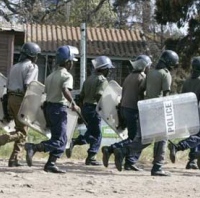 Therefore, Part II of the essay ends roughly in the same place as Part I in emphasising the role of the international community in stepping in to help out in terms of engagement, development assistance and aid. Mugabe is not likely to be overthrown tomorrow, and as a result countries would do better to discard the ‘wait and see approach’ in favour of something more active. The Inclusive Government, while a second best option, is a significant improvement on what came before it. With the apparently honest broker of Tsvangirai in charge of key Government service delivery portfolios, potential donors are more assured that their funds will reach the intended destination.
Therefore, Part II of the essay ends roughly in the same place as Part I in emphasising the role of the international community in stepping in to help out in terms of engagement, development assistance and aid. Mugabe is not likely to be overthrown tomorrow, and as a result countries would do better to discard the ‘wait and see approach’ in favour of something more active. The Inclusive Government, while a second best option, is a significant improvement on what came before it. With the apparently honest broker of Tsvangirai in charge of key Government service delivery portfolios, potential donors are more assured that their funds will reach the intended destination.
It is uncertain how long Tsvangirai and the Inclusive Government will be around, so it is in the interests of the international community to act sooner rather than later. Assisting the Inclusive Government to deliver reforms will have the added benefit of ensuring its continued survival. Such help will be crucial, because as the Inclusive Government nervously edges forward it will encounter numerous road blocks, its future is far from assured, and there is little doubt that Mugabe’s watchmen will be installed at vantage points along the way, lying in wait.
ENDNOTES:
(i) http://www.smh.com.au/news/world/mugabe-unlikely-to-pay-for-his-crimes/2008/04/03/1206851105833.html
(ii) Zimbabwe Institute, 2007. Progressive Zimbabwe, Sustainable Growth and Transformation. A Macroeconomic Paper.
(iii) A Kleptocracy is a country in which the Government and ruling class extend their personal wealth at the expense of the population. In such cases, the dictator uses the Government Reserve Bank as a personal bank account. Other notable examples include Seko in Zaire (now the Democratic Republic of Congo), Marcos in the Philipines, Abacha in Nigeria (the original ‘Nigerian scam’), Suharto in Indonesia, and Milosevic in the former Yugoslavia.
(iv) The in duplum rule, in law in certain countries, specifies that once interest owing on debt exceeds the amount of the unpaid principal, the interest is no longer payable.
(v) A favourite summertime holiday spot for Mugabe, his family and friends
(vi) Coltart, D., 2008. A Decade of Suffering in Zimbabwe. Cato Institute, Centre for Global Liberty and Prosperity, Washington D.C. Development Policy Analysis series, No. 5, 24th March 2008.
(vii) The former name for Zimbabwe.
(viii) In March 2008 Zimbabwe ordered GBP 1,000,000 of small arms, grenade launchers and mortars from China.
REFERENCES:
Collier, P. (2007). The Bottom Billion, Why the Poorest Countries are Failing and What Can Be Done About It. Oxford University Press, April 2007.
Cameron O’Neill is an economist and writer in Sydney, Australia.
